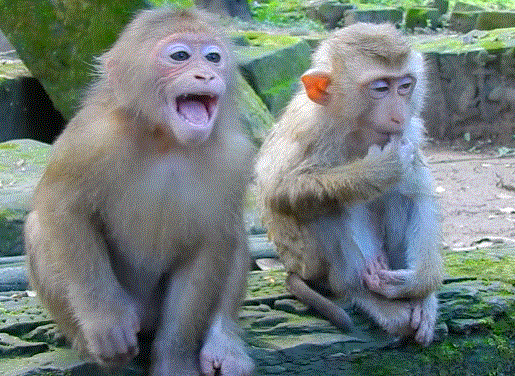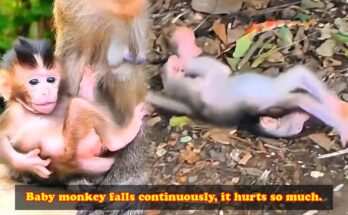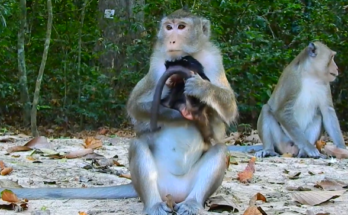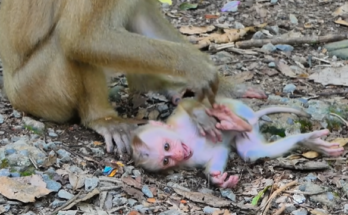The morning sun was soft and golden, filtering through the towering trees of Angkor Wat. The ancient stones seemed to breathe, alive with the whispers of monks and the calls of birds. Amid the echo of cicadas and rustling leaves, one sound cut through the forest — a baby’s cry.

Not a human baby.
A baby monkey.
His name was Barba.
I had been quietly filming the troop near the ruins when Barba’s cry reached me — raw, piercing, and heartbreakingly human. He was sitting on a cracked temple stone, his tiny body trembling, his round face wet with tears. His cries were so sharp and desperate that even the older monkeys paused to watch him.
Barba’s mother had moved away for a moment — perhaps to find food, perhaps to rest. But to a baby as small as him, that distance felt like the end of the world. His little hands shook. He looked left and right, then up at the towering trees, calling again and again for the one he trusted most.
Every sound he made carried a kind of innocence that breaks something inside you.
It wasn’t just noise — it was a plea.
I saw him try to follow her scent, stumbling over vines and roots, falling once, twice, before curling up on the moss-covered stone. He wrapped his tail around himself like a blanket. The forest, once alive, suddenly felt silent.
The Cry That Touched Everyone
When you watch a scene like that, you stop thinking about “animals” and “humans.”
You just see a small, helpless being — afraid of losing love.
Some tourists nearby turned their heads, their cameras lowering slowly. One whispered, “Oh no… he’s really crying.” And he was. You could see his chest heaving, his tiny mouth trembling as he made those heartbreaking little sounds.
The Angkor air was thick with humidity, but in that moment, it also felt thick with emotion.
Minutes later, his mother appeared — cautious, exhausted, and carrying a half-eaten fruit. When she saw Barba, she rushed toward him. His crying stopped instantly. He clung to her neck with such force that she nearly fell.
And then, silence again.
The kind of silence that feels like peace returning to a wounded heart.
A Lesson From a Small Heart
Baby Barba’s story reminds us of something we often forget — love is not measured by size or species. Whether it’s a child missing their mother at school or a baby monkey lost among the ruins, the emotion is the same.
That deep, primal fear of being left behind.
That desperate hope that someone will come back.
In nature, love isn’t spoken. It’s felt — through touch, warmth, and presence. Barba didn’t need words. The moment his mother returned, every tear dried as if the forest itself had exhaled in relief.
When I posted the clip later, messages flooded in.
One woman wrote, “I cried watching this. It reminded me of when my son cried at daycare for the first time.”
Another said, “Animals feel so deeply. We just forget to notice.”
That’s why I keep returning to Angkor Wat — not for the temples, but for moments like this.
Moments that show that love, even in its smallest form, is powerful enough to echo through time and stone.


